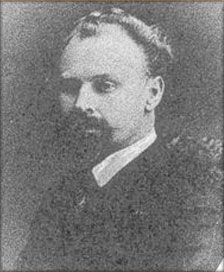Bogdan (Fedor) Aleksandrovich Kistyakovsky was born on November 4 (16), 1868, Kyiv. Date of death: April 16, 1920, Ekaterinodar. Jurist, philosopher and sociologist of neo-Kantian orientation.
Biography
Born in Kyiv in the family of a professor at Kyiv University, lawyer, criminologist and leader of the Ukrainian national movement, Alexander Fedorovich Kistyakovsky. From 1888 to 1892, he was successively expelled from Kyiv, Kharkov and Dorpat universities for participating in underground circles and student unrest. In 1895 he went abroad: he studied at the University of Berlin, the Sorbonne, the University of Strasbourg – in 1898 he defended a dissertation on philosophy “Society and Individuality”, which was published the following year in Berlin in German and was highly praised by German scientists. In 1901-1902 he studied law at the University of Heidelberg. He often traveled abroad to continue his studies in the future.
Lived in St. Petersburg, Kyiv, Moscow. He published in magazines and participated in the creation of the Liberation Union. At the beginning of the 20th century he moved away from Marxism.
Since 1906, he was a teacher of state and administrative law at the Moscow Commercial Institute, and at the same time taught at the Higher Women’s Courses. In 1909, as a master of public law, he was accepted as a private assistant professor at Moscow University. He supported the protest of professors against the violation of university autonomy and refused to teach in Moscow. He moved to the Yaroslavl Demidov Legal Lyceum as a private assistant professor, later as a professor in the department of encyclopedia and history of legal philosophy (1911-1916). Since 1917, professor at Kyiv University. One of the organizers of the Ukrainian Federal Democratic Party (1917).
In 1919, he was elected a full member of the newly created Academy of Sciences of Ukraine and, together with its first president V.I. Vernadsky, made a trip to Rostov-on-Don to A.I. Denikin in order to protect the interests of the academy, during which he fell ill and suffered operation and died in Ekaterinodar.
Wife – Maria Vilyamovna Kistyakovskaya (nee Bernshtam; pseudonym Veren M.V.; 1869 – 02.25.1932), writer, granddaughter of the Orthodox philosopher O.M. Novitsky. Together with N.K. Krupskaya taught at workers’ schools in St. Petersburg. She authored several books on pedagogy, including: “Stories about the struggle of man with nature” (from 1897 to 1927 the book went through 7 editions), “The first experience of a free labor school “Home of a Free Child”” (M.-Pg ., 1923; 2nd edition: M., 1924. In collaboration with E.E. Gorbunova-Posadova.
Sons:
Georgy (George) Bogdanovich Kistyakovsky (1900-1982) – American doctor of physics and chemistry, one of the leaders of the Manhattan Project, Eisenhower’s scientific adviser.
Alexander Bogdanovich Kistyakovsky (1904-1983) – a prominent Ukrainian biologist, orientologist, Doctor of Biological Sciences, professor.
Contributions to legal theory
The concept of law comes down to basic definitions: state-organizational, sociological, psychological, normative.
State-organizational or state-imperative concept of law. Law is what the state orders to be considered law.
State laws are a set of norms, the implementation of which is forced, protected and guaranteed by the state.
Sociological concept of law. Law – this term does not have a clear definition (“social solidarity”, “peaceful environment” and similar definitions). The laws of the state are drawn up on the basis of emerging legal relations; Both domestic and international precedents are taken into account.
Psychological concept of law. Law is a sense of legality. The laws of the state are a fixed set of those mental experiences of duty or obligation that have an imperative-attributive character.
Normative concept of law. Right is what one is obligated to do. The laws of the state are a set of norms that contain ideas about what should be, which determine the external relations of people among themselves.
Legal-dogmatic and legal-political concept of law.
Within the framework of these interpretations, the concept of law is understood as a systematization of legal phenomena for solving purely practical problems of dogmatic jurisprudence.
Law is a set of rules indicating how to find solutions in existing legal norms for all cases of conflict of interests or clash of ideas about right and wrong. With the help of various techniques of legal dogma, the norms of the current law are processed into legal concepts, categories and are thus brought into a logical legal system.
He took part in the magazine “Osvobozhdenie”, the collections “Problems of Idealism” (1902, article about the Russian sociological school) and “Vekhi” (1909, article “In Defense of Law”, about the legal consciousness of the Russian intelligentsia). From 1904 in Kyiv he collaborated in the journal “Questions of Life”. Edited the works of M. P. Drahomanov (volume I, Moscow, 1908). He was the editor of the Critical Review (1907-1910), Legal Bulletin (1913-1917), and Legal Notes (1912-1914).
